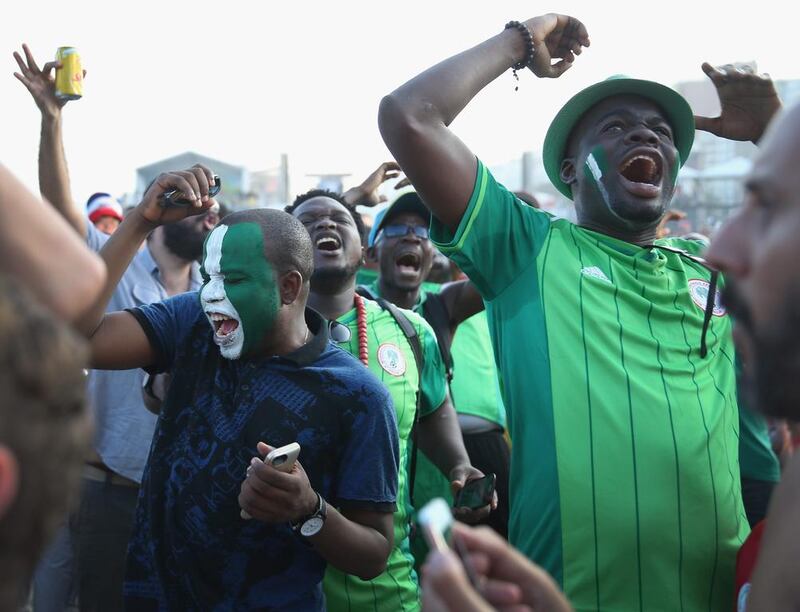The first survey of World Cup viewing habits among Africans confirmed what had long been assumed – fans across the continent are mad for the game.
Polling company GeoPoll said nearly 17.5 million Nigerian adults – about a fifth of the adult population – watched their team’s opener against Iran.
[ Click here to visit The National’s World Cup 2014 landing page ]
Across Africa, more than 25 million adults from Ghana, Kenya, Nigeria, Tanzania and Uganda watched the Nigeria game, making it the most-watched match over the first five days of play.
The figures represent a significant demonstration of support in Sub-Saharan Africa, which is home to many of the world’s poorest nations and where fewer than a quarter of households own televisions.
Putin gets ready
Russian president Vladimir Putin will jet to Brazil next month to take part in a handover ceremony at the end of the World Cup finals, with Russia gearing up to host the next championship, a newspaper report said.
Putin will attend an event following the July 12 final in Rio de Janeiro where his Brazilian counterpart, Dilma Rousseff, will pass on responsibility for the tournament to the Kremlin strongman, Izvestiya daily reported.
Diving debate heats up
The debate over diving began on Day 1 in Brazil and has people everywhere talking about whether simulation is part of the game or bad for the sport.
Coaches at all levels and players young and old are questioning the motives and sportsmanship on the sport’s biggest stage, and how such examples of flopping might affect the behaviour of the next generation.
Even 2012 US Olympic diving coach Drew Johansen is taking notice. “I have been watching the World Cup and have been very impressed with the dives I have seen,” Johansen said.
Of the controversial dive executed by Fred in Brazil’s opener, Johansen said, “I would score [it] at 9.5 on the Olympic scale.”
American evolution
Americans are starting to get rowdy and that is just dandy for fans whose devotion highlights a growing football culture in a nation slow to embrace the game.
Whether they call it football or soccer, US supporters revelling in Monday’s 2-1 win over Ghana are helping foster the kind of tribal and community ties that make the sport, and especially the World Cup, an indispensable event for many nations across the globe.
Guy Cross, an American born to an English father, has long supported the US national team but said attending games used to be frustrating.
“I remember France in 1998 and sitting in the stands where people didn’t know any songs,” Cross said.
“They couldn’t even sing Yankee Doodle Dandy. But it’s definitely evolved over the last 20 years. The support is more intense and broader and people are more knowledgeable about the game.”
Fans on a budget
Hundreds of cost-conscious football fans found a cheaper way to stay in one of Brazil’s most expensive cities – camping by Rio de Janeiro’s Copacabana Beach.
Many drove thousands of kilometres from other South American countries to support their national teams, avoiding expensive flights and Rio’s pricey hotels.
Brazilians, Argentines, Colombians, Chileans and Ecuadoreans have parked old cars, trailers and small buses and turned them into rolling dormitories along Avenida Atlantica, one of Rio’s most famous areas.
Follow our sports coverage on twitter at @SprtNationalUAE





